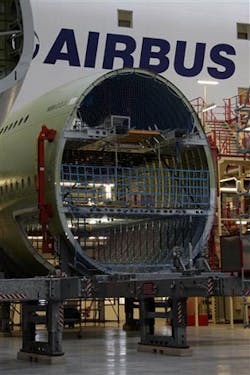Airbus Warns Of Delivery Delays For A380 Superjumbos
Airbus said Tuesday that deliveries of its new superjumbo A380 could be delayed by up to seven months, with airlines likely to get only nine planes next year, problems the European manufacturer blamed on production-line bottlenecks.
Airbus said flight certification of the 555-passenger aircraft and the first delivery to launch customer Singapore Airlines were still expected by year's end. Progress in flight testing is "satisfactory," the company added.
But "the delivery schedule will undergo a shift of six to seven months," said a statement from the aircraft manufacturer. It said the new delays were mainly due to bottlenecks with the plane's electrical systems.
"Modifications of electrical systems and reworks have been necessary ... progressively disturbing the final assembly flow," it said. "Airbus is fully aware of the burden this industrial issue represents for the airlines who are anxious to begin operating the A380."
Noel Forgeard, head of Airbus's parent company, European Aeronautic Defence and Space Co., or EADS, said earlier this year he expected between 20 and 25 deliveries next year of the A380, each with a list price of nearly $300 million.
Deliveries of the double-decker aircraft will likely be limited to nine in 2007, with an additional shortfall of five to nine A380 deliveries expected in 2008 and "around five" in 2009, Airbus said.
Airbus had said previously it was confident it could deliver two aircraft before the end of 2006.
The Toulouse, France-based company has 159 orders for the A380 and delivery slots have been taken up through 2011.
Airbus landed the A380 at London's Heathrow airport last month in a test and said that development costs were within the $12.2 billion budget.
The launch of the A380 had previously been delayed by between three and six months. While most new aircraft are subject to some delay, this latest setback would be an embarrassment to Airbus - and will cost it hefty financial penalties for late deliveries.
Airbus's chief commercial officer, John Leahy, told Dow Jones Newswires that the company will incur more late delivery penalties, but declined to provide a figure.
He said Airbus is talking to customers to explain the situation.
"Naturally, they're not happy," he said, "but nobody's questioning their commitment to the aircraft. In fact, we've been talking to some customers about firming up their options."
However, Airbus has given assurances to China Southern, which has ordered five A380s, that it will start receiving its aircraft before the start of the Beijing Olympic Games in 2008, Leahy said.
Leahy said the production slowdown is likely to cause a delivery shortfall of between five to nine aircraft in 2008 compared to the 35 originally planned, and that 2009 deliveries could be about five less than the 45 originally planned.
"In a modern aircraft like the A380, everything is integrated. Even minor changes required for certification, or to comply with customers' specifications, can cause a lot of extra work," Leahy said.
Airbus is owned by European Aeronautic Defense & Space Co. and BAE Systems PLC. BAE Systems in currently trying to sell its 20 percent stake and EADS has said it is interested in taking full control.
EADS said the revised delivery schedule will not lead to a change in its 2006 outlook for earnings before interest and taxes.
But from 2007 to 2010, EADS said it anticipates annual shortfalls of contribution from the A380 program of about 500 million euros ($628 million) relative to the original baseline plan.
The production delay comes as Airbus also faces potential troubles related to wake turbulence created by the behemoth four-engine jet. The Wall Street Journal, citing people involved in the discussions, reported Monday that aviation regulators and aerodynamic experts meeting last week were unable to agree about what sort of safety hazards the plane's wake could pose.
The issue has gained significance because Airbus has told airlines the A380 would fit into normal airport operations, but any unusually powerful wake turbulence from the jet could force landing and takeoff delays, and might make some airlines reluctant to buy it.
Last month, EADS had said it expected to begin showing a profit on the new A380 airplane in 2008.
David Pearson contributed to this report.
News stories provided by third parties are not edited by "Site Publication" staff. For suggestions and comments, please click the Contact link at the bottom of this page.

